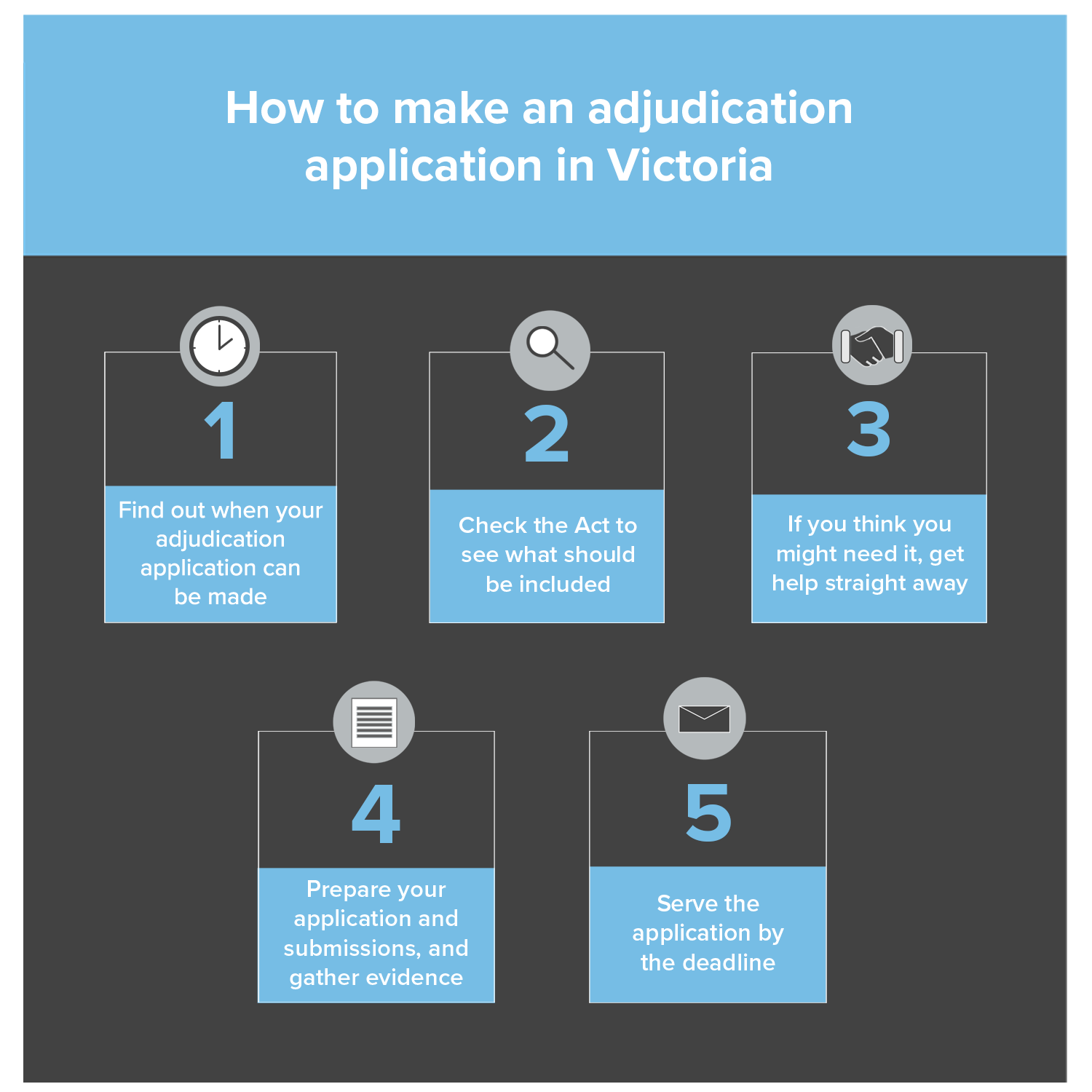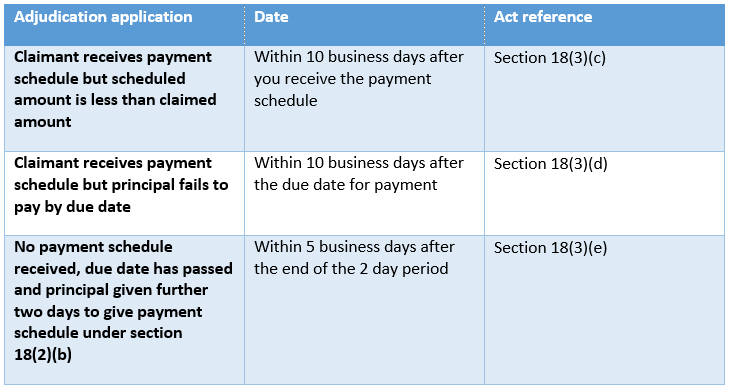This page explains how to make an adjudication application under the Building and Construction Industry Security of Payment Act 2002 (Vic).

The purpose of the Act and adjudication is to offer contractors a streamlined process that allows the contractor (the claimant) to recover a disputed or unpaid progress payment. Keep in mind that in Victoria, there are limits on what can be included in a payment claim and pursued through adjudication. You can read more about how to make a payment claim under security of payment in Victoria here.
If you aren’t sure how to make an adjudication application under the Victorian security of payment legislation, we suggest the following approach:
1. Find out when (and how) your application needs to be lodged.
2. Check the Act to see what should be included in your adjudication application.
3. If you think you might need it, get help straight away.
4. Prepare your application and submissions, and gather evidence dealing with the substance of the claim.
5. Serve the application by the deadline.
Each of these steps is explained in more detail below.
You can read more about the Victorian security of payment legislation in general here.
1. When can an adjudication application be made?
There are strict timelines for when an adjudication application can be made. When your adjudication application needs to be lodged is determined by section 18 of the Act. The deadline for submitting your application will differ depending on the circumstances. The Act provides for three possible scenarios:
- If you receive the payment schedule but the amount is less than the claimed amount, you have 10 business days from the day you received the payment schedule to lodge an application.
- If you have received a payment schedule and you do not dispute it, but the principal fails to pay by the due date, you have 10 business days from the due date of payment to lodge an application.
- If you do not receive a payment schedule and your payment claim is not paid in full, you will need to issue the principal with a notice of your intention to apply for adjudication within 10 business days after the due date for payment has passed. The principal then has the opportunity to provide a payment schedule within two business days of receiving your notice.
If there is still no response, you have five business days from the end of that two day period to lodge your adjudication application. You can download a PDF flowchart of the key dates here.
Once you have determined when your application is due, you should think about which nominating authority you will use, and how you plan to serve the application.
2. Check the Act to see what should be included in your adjudication application.
Most authorised nominating authorities (ANAs) will provide an adjudication application form. You can find a list of nominating authorities here. If the contract lists three or more ANAs, you must make your application to one of those authorities.
The ANA will then nominate an adjudicator, who must accept the nomination within four business days of the adjudication application being lodged. Both you and the principal will be notified of their acceptance. If the adjudicator does not accept within four days, you may withdraw your application and apply with a different ANA within five business days (section 28(3)).
Your adjudication application must:
- be in writing;
- be made out to an ANA;
- identify the payment schedule to which it relates; and
- if required by the ANA, be accompanied by an application fee.
The application should include a copy of the contract, the payment claim and the payment schedule (if one was received). You may also include any submissions relevant to the application.
Most ANAs will accept service electronically (i.e. by email or document upload), and you can contact them to find out. Sometimes (but not always) the ANA will send you a note explaining how you can respond. You should always rely on the terms of the Act to check the timeframes and confirm what is required.
If you will be serving a large volume of material, you should allow plenty of time to make sure it can be safely delivered before the deadline.
3. If you think you might need it, get help straight away.
If you think you might need assistance preparing your adjudication application, it’s critical that you seek help as early as you can. Some parts of the Act are highly technical, and an experienced construction lawyer will be able to help you work through the issues. (You can contact us here.)
No matter how good they are, a lawyer will not be able to achieve much if they only receive instructions a short time before your application is due.
4. Prepare the submissions and gather evidence dealing with the substance of the claim.
Once you understand what can be included in your adjudication application, it is time to start putting the application together, including the supporting documentation.
Adjudication applications can sometimes be lengthy documents. It is not sufficient for the claimant to rely solely on the payment claim and state that they are entitled to payment.
Usually, an adjudication application would include:
- submissions to the effect that the work was done and/or related goods and services were supplied as required under the contract;
- a copy of the contract, or if the contract was agreed verbally, submissions with the terms of the oral agreement, and any emails or correspondence supporting this;
- submissions indicating the nature and extent of the work carried out (including any rectification or defects work);
- submissions clearly setting out calculations of the total amount claimed, with itemised works and the total;
- witness statements, expert reports, test results, photographs, invoices, statutory declarations, or other documentation or correspondence that supports the claim, attached as numbered documents; and
- legal submissions which support the claim.
5. Serve your adjudication application by the deadline.
Once your application is finalised, make sure you serve it on the adjudicator before the deadline.
You must also serve a copy of your application and supporting documents on the principal in accordance with section 18(5) of the Act.
 You can find out about the adjudication process, including how the adjudicator will make its decision, here.
You can find out about the adjudication process, including how the adjudicator will make its decision, here.
Need help preparing an adjudication application? Click here.






